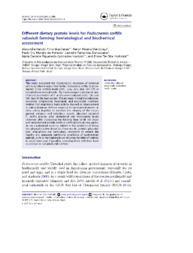Different dietary protein levels for Podocnemis unifilis subadult farming: hematological and biochemical assessment.
Different dietary protein levels for Podocnemis unifilis subadult farming: hematological and biochemical assessment.
Author(s): BRASILIENSE, A. R. P.; MENDONÇA, R. P.; ALMEIDA, P. E. M. de; DAMASCENO, L. F.; HOSHINO, M. D. F. G.; YOSHIOKA, E. T. O.
Summary: This study evaluated the physiological responses of subadult yellow-spotted Amazon river turtle, Podocnemis unifilis, to incremental crude protein levels (29%, 32%, 35%, and 39% CP) as extruded commercial feeds. The hematological and plasma bio-chemical parameters of P. unifilis were analyzed at 60, 120, and 180 days of the feeding trial. The increase in total thrombocyte, leukocyte, lymphocyte, heterophil, and eosinophil numbers, besides high respiratory burst activity showed an improvement in animal immune defense response to incremental protein in diets, acting together to maintain the integrity of the tissues against antigens and infectious agents. Elevated subadult P. unifilis plasma total cholesterol and triglyceride levels observed after increasing the feeding time (until 180 days) with incremented protein levels in artificial diets during captiv-ity are a nutritional warning, related to the condition of being less physically active. Based on these results, periodic physiological evaluations are particularly important to ensure the healthy and adequate nutritional conditions of captive-bred animals, such as maintaining lower stocking densities of animals to avoid stress and, if possible, providing them with fresh food in addition to extruded artificial feed.
Publication year: 2021
Types of publication: Journal article
Unit: Embrapa Amapá
Keywords: Animal nutrition, Genetic, Genotypes, Nutrição Animal
Observation
Some of Embrapa's publications are published as ePub files. To read them, use or download one of the following free software options to your computer or mobile device. Android: Google Play Books; IOS: iBooks; Windows and Linux: Calibre.
Access other publications
Access the Agricultural Research Database (BDPA) to consult Embrapa's full library collection and records.
Visit Embrapa Bookstore to purchase books and other publications sold by Embrapa.

